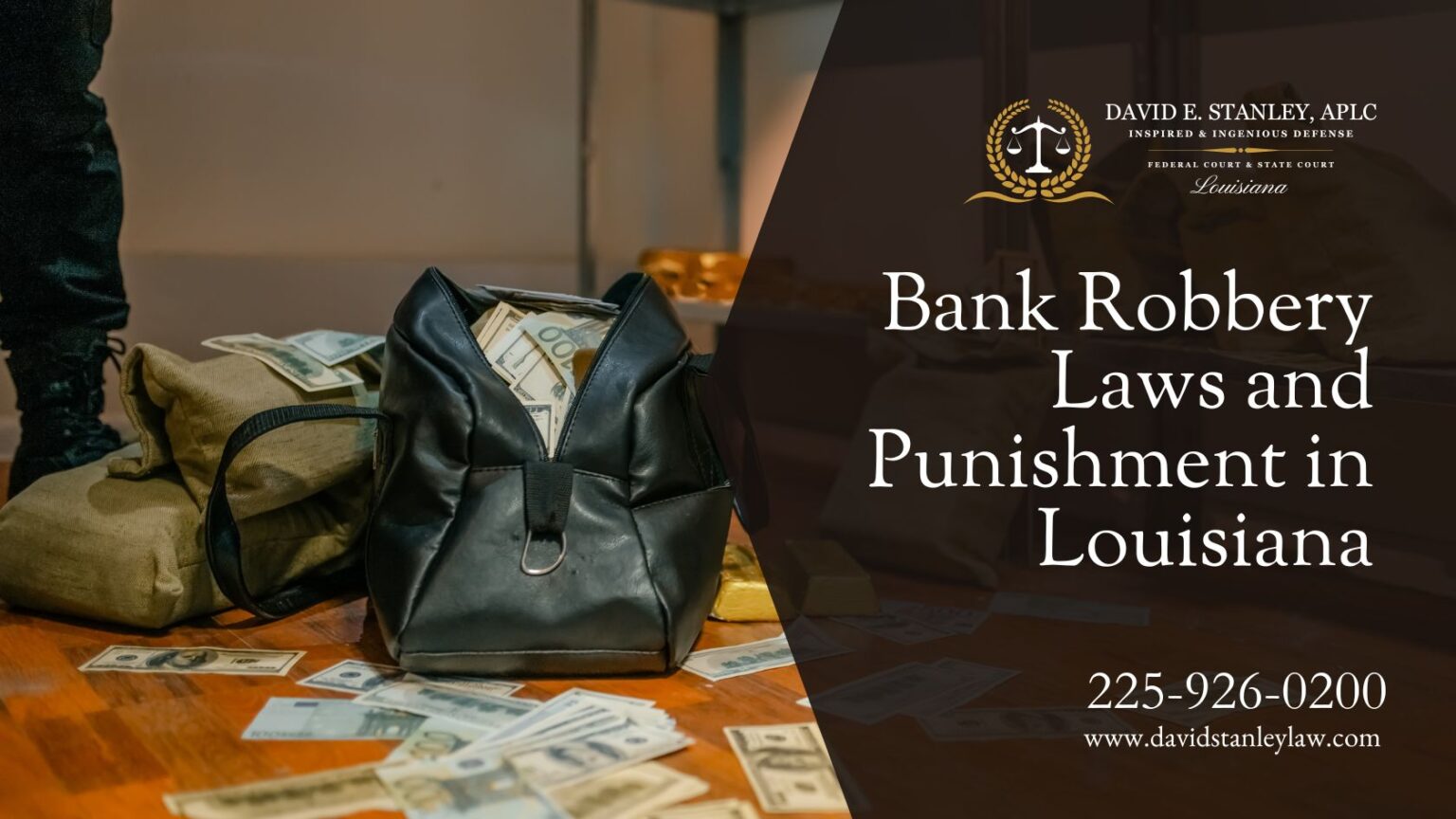
Bank Robbery Defense Attorney in Louisiana
Table of Contents
ToggleBank robberies have been glamorized in movies and TV shows. However, in reality, bank robberies are one of the most severe offenses for which a person may be prosecuted, carrying heavy fines and jail terms. The act of robbing a bank while putting its staff and passersby in danger is known as a bank robbery, and it is precisely what it sounds like. The difference between it and burglary is that it often entails breaking into a bank after hours.
Because banks are stocked with cash, people rob them. Bank robberies continue to happen despite the sophistication of financial security systems. Although entering a bank and demanding money while threatening violence is the basic definition of a bank robbery, many more situations might result in a bank robbery charge or other penalties. This includes the use of a deadly weapon. Therefore, it is best to see a criminal defense lawyer as soon as possible if you or someone you care about has been accused of bank robbery.
What is Bank Robbery?
A federal bank robbery is defined as stealing money or property from a bank, credit union, or savings and loan institution using threats or acts of force. This includes instances in which you enter or try to enter a financial institution to commit a criminal crime that impacts the institution and violates any U.S. law or to steal anything.
Naturally, most federal charges for bank robbery cases include the iconic scenario when someone holds up a bank teller with a firearm or takes money forcibly. However, the federal bank robbery act is significantly more comprehensive and covers a broad range of criminal behavior when a bank is a victim.
What Constitutes a Bank Robbery?
The appearance of a bank robbery is known to all of us. They have appeared in a large number of films and television programs. It’s crucial to remember that specific requirements must be met for a crime to qualify as a bank robbery. A gun or other weapon must first be present (or the implication of a weapon). Additionally, there must be a risk of harm or death. The last step is to steal money. Even though no one was wounded, the law may see the situation differently than you do.

Factors That Could Affect Your Case
- During the crime, others suffered harm or died
- Use of weapons, including guns
- Using a stolen car
- Prior events’ history
- Accomplices
- Amount of victims
- Amount of the theft
F.B.I.'s Role in Bank Robbery Cases
Since the 1930s, the F.B.I. has played a significant part in federal bank robbery investigations. At that time, John Dillinger and his crew robbed banks across the Midwest. Robbery of a national bank or a state member bank that is a component of the Criminal Reserve System was made a federal offense in 1934. This rule was rapidly extended to include theft, bank robbery, and other offenses. As a result, the F.B.I. was granted authority over these significant federal offenses. In the present day, the F.B.I. concentrates its primary resources on those who pose the greatest danger to public safety. Additionally, the Bureau still often assists state and local law enforcement with their investigations into bank robberies that occur in their areas.
Banking Robbery Laws
Laws governing “regular” robberies are substantially less severe than those governing bank robberies. The leading cause is that banks are federal institutions rather than private businesses like supermarkets or other places that are often stolen. Therefore, robbing a bank is a federal felony, which entails federal accusations and a federal penalty. Because of this, the sentences for bank robberies are nearly always substantially harsher than those for other robberies.
It’s crucial to remember that anybody may be accused of bank robbery even without the use of a firearm. Bank robbery will be defined as little more than handing a teller a letter demanding money. Almost always, the federal authorities will bring charges for bank robberies.
Criminal Charges for Bank Robberies
There are many sorts of robbery, and factors like the technique used and the quantity of money taken will determine the particulars of a punishment. However, the fundamental concepts to comprehend are:

A significant punishment and up to 20 years in jail might be imposed on anybody who enters a facility utilized entirely or in part as a bank to forcefully withdraw money or perform any other crime that would harm the institution. This comprises only entering a bank and presenting a note to a teller.
More severe punishment and up to 25 years in jail are conceivable when a robbery endangers the life of another person or includes aggression. This covers making threats and employing any weapon during a robbery, including toy ones.
Anyone who receives, hides, or in any other way accepts anything stolen from a bank may be subject to a fine and a jail sentence of up to 10 years.
Robberies that result in the death or kidnapping of a victim may result in even harsher punishments, such as the death sentence or life in prison.
Punishment for Bank Robbery
There may be other accusations, such as abduction, assault, and murder, that accompany a bank robbery. Therefore, the nature of a robbery will directly affect the sentence meted out. Fines may be in the tens of thousands or as little as $1,000. For a typical robbery case, jail terms typically start at roughly ten years and may exceed 25 years. Life sentences and the death penalty may be imposed when abduction or murder are involved. The sentence imposed in the event of a conviction might vary depending on the offender’s criminal history and other considerations.
Guidelines for Punishing Bank Robbers
Convictions for bank robberies depend on the details of the heist. Many different things may lengthen a sentence. Possible deciding elements used during sentencing include:
- Whether a weapon was used or not. The sort of weapon used could also have an impact on the sentencing.
- The amount of money that was taken during the heist
- Whether or not the robbery resulted in any injuries or fatalities
- The possibility that someone or people were kidnapped during the heist
- Criminal record of the person. Each offender is assigned one of six criminal history categories under the federal sentencing guidelines. This is based on the length of his previous sentences and how recently those offenses happened.
- Whether the offender acknowledges guilt for the offense before a guilty judgment is reached, the punishment can be considerably lowered if the suspect acknowledges his involvement in the crime or pays restitution.
Statute of Limitations for Bank Robberies
The statute of limitations for bank robberies is five years under federal law. A person can only be tried at the federal level at that point. Specific state laws, nevertheless, could give rise to accusations with far longer statutes of limitations.
Bank Theft Defenses
Although those accused of bank robbery face significant federal accusations, there are several strong strategies to defend yourself. First, according to the defense, the prosecution’s evidence may not prove that the defendant committed the crime. Defendants may acknowledge committing the crime but argue that specific circumstances exonerate them from responsibility.
Innocence
The federal government must prove beyond a reasonable doubt that the defendant committed the offense in any criminal trial. However, due to the high standard of proof, a person accused of robbing a bank may challenge the government’s evidence or produce information that disproves it to escape conviction. For instance, the bank robbery defendant can claim that he can establish that he had an alibi, indicating that he had left the country a week before the crime. Or, he can contend that he was at a party when the robbery occurred and that eyewitnesses would support him. Additionally, the defense may contest the accuracy of eyewitness identification, the caliber of security cameras, and any other evidence the prosecution may have. Although these strategies may seem absurd, keep in mind that the defendant does not need to persuade the jury that he is innocent. Instead, he merely has to raise a legitimate question about the case.
Intoxication

In certain robbery instances, the offender may provide evidence that they were impaired by alcohol or drugs when the act was committed. This may be considered involuntary drunkenness, where any intoxication beyond the defendant’s control could be used to justify any unlawful action.
A robbery defendant may potentially agree to a lower charge in certain circumstances if he admits to being drunk when the crime was committed. Whether the accused might have developed the required intent to commit robbery is the critical issue in a voluntary drunkenness defense. Robbery calls for the accused to have the intention to use force or compulsion to take another party’s property, yet being inebriated may prevent the defendant from developing this intention.
Entrapment
It can be feasible to use an entrapment defense if another party coerces the defendant into committing a bank robbery that they otherwise would not have done. The case of entrapment is challenging to establish. However, entrapment might be claimed if the defendant can show that the party who was robbed somehow initiated the incident so that charges would be filed against the person.
Duress
Robbery charges may be dropped if you demonstrate that someone threatened you with death or physical injury to coerce you into doing the crime. However, it may be challenging to demonstrate this, and some courts can reject a duress defense because the accused did not demonstrate a sufficient level of fear of danger or because he had several opportunities to refrain from the crime without running the risk of catastrophic injury or death.
Frequently Asked Questions:
Is Robbery a Felony in Louisiana?
Many different types of robberies may be committed in Louisiana, but regardless of the particular robbery, they are all violent felonies with the potential for a lengthy prison sentence.
In Louisiana, What are the Consequences for Robbery?
For an armed robbery conviction, the penalty is “imprisoned at hard labor for not less than ten years and not more than ninety-nine years, without the benefit of release, probation, or sentence suspension.”
How Long is a Sentence for Bank Robbery?
Bank robbery is a severe violation under federal law, and you risk receiving a term of up to 20 years in federal prison, a fine of up to $250,000, or both. In addition, you could be subject to harsher punishments if you robbed the bank violently.
Your Reputable Bank Robbery Attorney in Louisiana

Charges of bank robbery should not be taken lightly. Call the seasoned and successful team at the Law Office of David E. Stanley, APLC, for an immediate case consultation if you or someone you know is being investigated for bank robbery in Baton Rouge and the surrounding areas. Time is of the essence since your freedom and future are at stake. The sooner you build your defense, the more chance you have of succeeding.
Looking for A Bank Robbery Criminal Defense Attorney ? David Stanley, APLC is a seasoned and trusted federal criminal defense attorney who can help and guide you through your legal battle. We serve the following areas:
Criminal Defense Attorney Ascension Parish, LA
Criminal Defense Attorney Baker, LA
Criminal Defense Attorney Baton Rouge, LA
Criminal Defense Attorney Central City, LA
Criminal Defense Attorney East Baton Rouge Parish, LA
Criminal Defense Attorney East Feliciana Parish, LA
Criminal Defense Attorney Greenwell Springs, LA
Criminal Defense Attorney Iberville Parish, LA
Criminal Defense Attorney Lafayette Parish, LA
Criminal Defense Attorney Livingston Parish, LA
Criminal Defense Attorney Pointe Coupee Parish, LA
Criminal Defense Attorney Pride, LA
Criminal Defense Attorney St. Tammany Parish, LA
Criminal Defense Attorney Tangipahoa Parish, LA
Criminal Defense Attorney West Baton Rouge, LA
Criminal Defense Attorney West Feliciana Parish, LA
Criminal Defense Attorney Zachary, LA
Looking for a Reputable Criminal Defense Attorney?
Contact David E. Stanley, APLC
Now for an Appointment
Call 225-926-0200
David E. Stanley, APLC
1055 Laurel St #2, Baton Rouge, LA 70802, United States
225-926-0200


